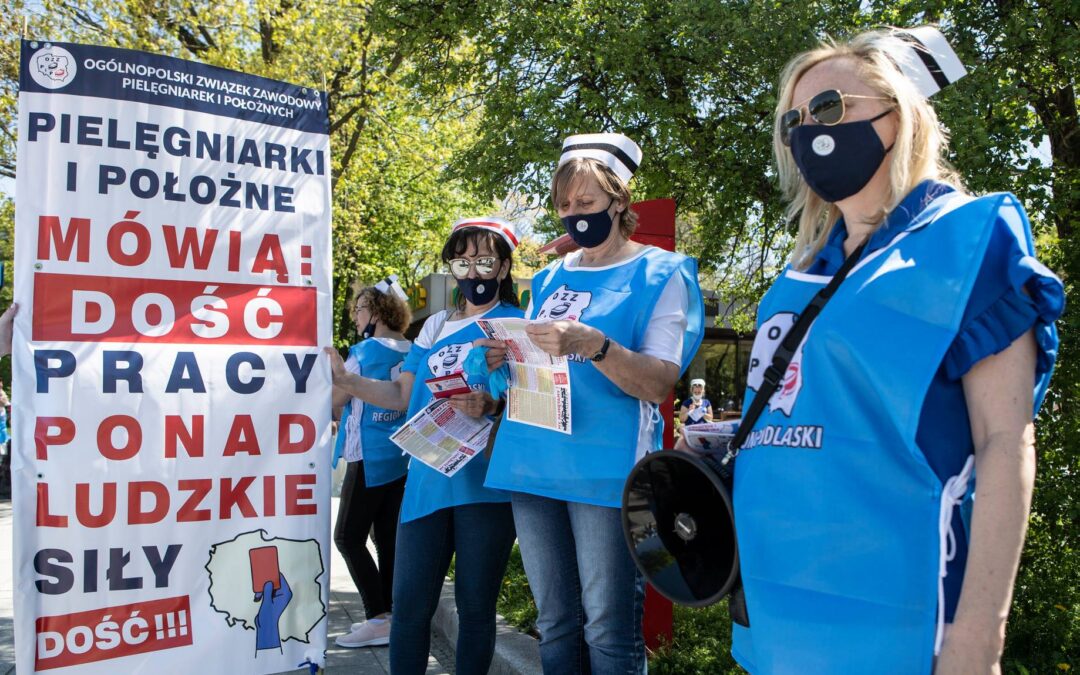A Polish nurses union has declared a national “warning strike” on 7 June over pay demands, following the collapse of talks with the health ministry.
The National Union of Nurses and Midwives (OZZPiP) – Poland’s largest union of medical professionals, with around 80,000 members – is calling for pay rises as well as changes to legislation on minimum pay in the healthcare sector. They note that the system is heavily understaffed and underfinanced.
Poland’s ratio of 5.1 nurses and midwives per 1,000 residents is the fourth lowest among European Union member states, and well below the EU average of 8.2. Poland also has the lowest number of doctors in relation to population.
“There are fewer and fewer of us,” says Krystyna Ptok, head of OZZPiP. “We demand pay rises and incentives for young people to get nursing training.”
The union notes that the average age of nurses in Poland is now 53, while more than half are over 60. Ptok points out that around 10,000 nurses and midwives are due to retire soon and only about 5,000 students graduate each year, not all of whom opt for a job in the Polish healthcare system.
Representatives of OZZPiP this week broke off negotiations with the health ministry, which have been ongoing since February, during what was labelled a “last chance meeting” on Monday.
OZZPiP argued that Adam Niedzielski, the health minister, “had nothing to offer them”. A spokesman for ministry, however, claimed that OZZPiP had walked out due to the fact that other trade unions were also invited to the table.
Subsequently, Ptok announced that the union had decided to stage “a warning strike in hospitals all around Poland and solidarity actions supporting the activities of nurses and midwifes” on 7 June.
On that day, nurses will only work their regular hours and will refuse to take any extra shifts. In doing so, they aims to draw attention to the fact that the system is understaffed and currently only functions due to nurses covering a number of posts. “One nurse, one post” will be the motto of the protest, reports RMF.
Ptok also argues that new legislation proposed by the government to regulate minimum pay for medical professionals is “discriminatory”. She notes that “nurses with bachelor’s degrees are included in the group with medium, not higher, education”.
This, the unions argue, could result in the pay of some nurses going down by 1,300 zloty (€288) a month from 2 July, when the law is due to come into force. The union expects the government to revise the index on minimum pay.
“If a nurse or a midwife who graduated with a bachelor’s degree is offered the same pay as a medical secretary, it is a disgrace to our profession,” Bernarda Machniak, a regional OZZPiP head, told RMF.
OZZPiP wants the starting salary for a nurse or midwife to be “one and a half times the national average in the fourth quarter of the last year” – around 8,000 zloty (€1,773) gross. It would then increase gradually and, after 20 years of service, they could expect around 12,000 złoty.
Machniak told RMF that the ministry did not respond to their proposal. However Adam Niedzielski, the health minister, paints a different picture of the negotiations.
“We can say that we have reached an understanding. We have put 3.5 billion złoty on the table and most parties accepted that,” Niedzielski told state broadcaster TVP Info. He admitted that “one union” did not sign the agreement, but hoped that in the next round of negotiation he would be able to come to terms with all groups.
In recent weeks the union has already held demonstrations in Warsaw demanding better working conditions and financial support for medical professionals.
Pielęgniarki mają dość. Dziś rozmowy ostatniej szansy z ministerstwem zdrowia. "Liczę na otrzeźwienie ministra" – mówi Krystyna Ptok, szefowa związku @SlawomirZagors2 #koronawirus #pielęgniarki #zdrowie #OKOPRESS https://t.co/L7eWdNWqfB pic.twitter.com/dHqHmIJwc6
— OKO.press (@oko_press) May 17, 2021
“We work 300 hours a month, in two to three [different] places,” said Ptak at a protest in front of the health ministry last month. “We want better work conditions here and now! We can’t wait until 2027.”
Separately, on Monday this week operators of emergency numbers staged a protest in front of parliament in Warsaw demanding dialogue over legal changes that would improve the functioning and funding of the system.
“Lack of professional prospects and low income…lead to constant turnover of employees,” claimed the organisers of the protest. “Current shortages of staff may lead to failures [of the emergency system].”
Operatorzy numerów alarmowych wyszli na stołeczne ulice, aby zwrócić uwagę na problemy, z którymi borykają się w pracy.
ZOBACZ:https://t.co/wFVllqydJo
— TVN Warszawa (@tvnwarszawa) May 17, 2021
Main image credit: Ogólnopolski Związek Zawodowy Pielęgniarek i Położnych/Facebook

Agnieszka Wądołowska is deputy editor-in-chief of Notes from Poland. She is a member of the European Press Prize’s preparatory committee. She was 2022 Fellow at the Entrepreneurial Journalism Creators Program at City University of New York. In 2024, she graduated from the Advanced Leadership Programme for Top Talents at the Center for Leadership. She has previously contributed to Gazeta Wyborcza, Wysokie Obcasy and Duży Format.




















